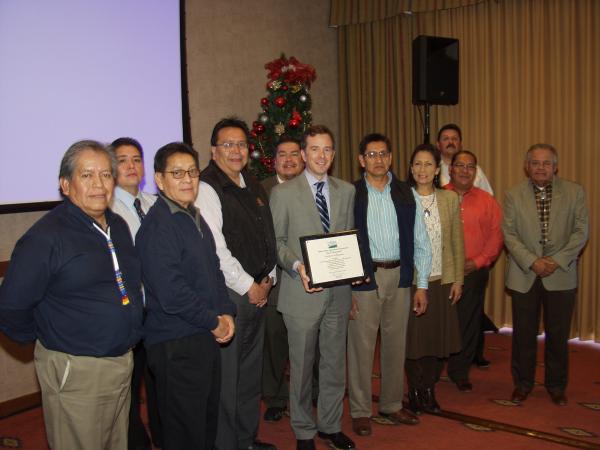
USDA Rural Development State Director Terry Brunner (center) presents a certificate of obligation honoring the successful application of funds to create the first ever Native American food hub in the nation to the Ten Southern Pueblos Council made up by the governors of each Pueblo. The presentation was made to the governors and their representatives during presentation ceremonies at Sandia Pueblo.
Source: Indian Country Today Media Network
Native farmers’ business should receive a nice boost in the near future, thanks to a recent grant and certificate of obligation given to the Acoma Business Enterprise, LLC to develop a business plan for a food hub.
USDA Rural Development State Director Terry Brunner presented the certificate to the Acoma Business Enterprise during the ceremony held at the Southern Pueblos Council monthly meeting.
“The Obama Administration is working hard to create economic opportunities in rural tribal communities,” Brunner said. “This strategic investment will help Native farmers find new markets for their products and offers a path to sustainable farming in the 21st century.”
The $75,000 grant for this project was made available through the Rural Business Enterprise Grant (RBEG) program (RBEG), which promotes development of small and emerging businesses in rural areas. Specifically the RBEG funding will be used to develop a comprehensive business plan and marketing study to create a Native Food Hub, which will be the first of its kind in the nation.
The need to develop a marketing plan came about because the Native American farmers found at the end of the growing season they usually had an abundance of produce that was not being sold or utilized. A food hub will ideally offer a location where native producers can deliver their goods for processing and distribution to market.
The Acoma Business Enterprises was requested by the 10 Southern Pueblo Council to apply for the funding because of the company’s capacity to create the plan and administer the implementation of the marketing of the produce grown in the 10 pueblos.
The RBEG program may also be used to help fund distance learning networks and employment-related adult education programs. Eligible applicants for the program include public bodies, nonprofit corporations and federally recognized Indian Tribes. Since the beginning of the Obama Administration, the RBEG program has helped create or save more than 73,000 rural jobs, provided over copy70.9 million in economic development assistance, improved manufacturing capability, and expanded health care and educational facilities, and has either expanded or helped establish almost 41,070 rural businesses and community projects.
President Obama’s plan for rural America has brought about historic investment and resulted in stronger rural communities. Under the President’s leadership, these investments in housing, community facilities, businesses and infrastructure have empowered rural America to continue leading the way – strengthening America’s economy, small towns and rural communities. USDA’s investments in rural communities support the rural way of life that stands as the backbone of our American values.
Read more at http://indiancountrytodaymedianetwork.com/2013/12/16/creating-first-native-american-food-hub-us-152733
